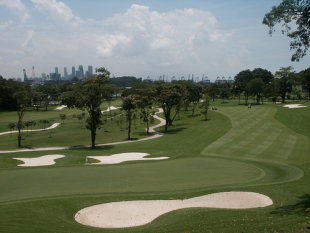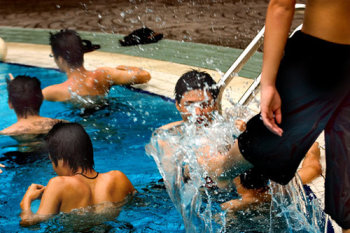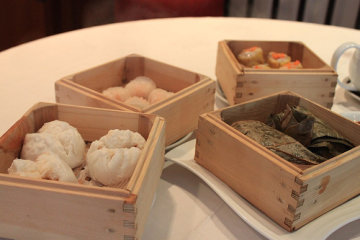insight
工程技术,地产投资,信仰家园,时尚生活Country clubs are going the way of Chia pets. They’re awesome for a while; then we realize they’re pricey, need too much maintenance, and (after a few years) become as exciting as a Wheel of Fortune re-run. In this article, I examine why interest in country clubs is dimming. And the things you’d better know before joining:

Ah, the perfect economic solution to a land scarce island!
What is a Country Club?
Maybe lifestyle club would be a better term; the closest we come to “country” around here is a pirated Deliverance DVD.
The idea’s that you pay a membership fee to the club, in exchange for using their premises. You get access to the club’s jackpot rooms (they have a license), restraunts, lifestyle activities, etc. And because the number of members is limited, there will theoretically be resale value in your membership.
Some clubs are built for specific sports or groups (e.g. swimming clubs, the American Club). Most of these are still open to all, but you may find fee differences, or differences in membership types.
There are around 21 clubs in Singapore. Some are low cost and highly accessible to the public (e.g. SAFRA), but most are exclusive.
How Much Do These Cost Anyway?
 overcrowded swimming pool
overcrowded swimming poolAll are welcome, members or not. Just hide that guest coupon really well.
Membership in the “typical” club ranges between $5,000 to over $15,000. High-end clubs can cost a lot more; Singapore Island Country Club, for example, has a membership fee of over $220,000.
This fee is usually a one time payment. After that, monthly fees range from $0 to a few hundred dollars.
Note that some clubs offer subscriptions, which are different from memberships. Subscriptions typically last one to three years, during which you can use the facilities as if you were a member (but you’re still not).
Why? Well I asked the general manager at my club, who declined to be named:
“There are two main reasons for allowing subscriptions.
First, the number of members is capped. In filled-up clubs, subscribers add to the club’s coffers, while still preserving the exclusivity of membership.
Second, not everyone can afford to fork out huge sums for a membership. So subscription lets these other people enjoy the facilities, but the members benefit most because the club has more money for upgrades.
In clubs that haven’t hit their quota, it’s common to offer subscribers a membership deal, once it’s time for them to renew.”
Typical fees for subscriptions are around $2,000 to $3,000 for a single year. The price is usually discounted if you buy a longer subscription (e.g. $2,000 for one year, $5,000 for three years).
So clubs are expensive, but not a completely awful deal. So why is it many Singaporeans aren’t interested?
1. Clubs Have Stopped Being Investments

Put it this way: If you NEED to invest, you can’t afford it.
In the past, clubs became popular because they were seen as investments.
Hey, there were only so many memberships to go around. And once your club filled up, you were like one of the people who got a lifeboat on the Titanic. You could have sold your place for anything. In fact, this became the backbone of a whole industry: Club membership brokers, who are still around today.
Then clubs decided to get a piece of that, and imposed transfer fees. Marianne Teo, who’s sold two of her club memberships before, says:
“Most clubs have transfer fees, or very tight restrictions on transfers. If you look up the Chinese Swimming Club for instance, I think they have more than 12 kinds of memberships. But only four are transferable. And they charge a transfer fee of more than $6,000*.
Singapore Swimming Club I think charges around $8,000. Also, there are restrictions; in some clubs, if your family has membership and you transfer, your family members may end up losing their memberships as well.
To me, clubs are no longer an investment. They are just for leisure.”
*The actual price is $6,420 on their website.
2. There’s Only Two Facilities Everyone Seems to Want
 Bar with liqour bottles
Bar with liqour bottlesAlthough the longer I spend in the bar, the more facilities I appreciate. Like the clean toilet floors.
Many of a club’s main facilities (pool, gym, event hall) are also found in a condo. And the bulk of people who’d consider joining a club? They aren’t living in HDB flats.
Michael Oon, who recently sold his membership, felt there was no point:
“What am I getting out of a club, that I don’t already have access to? I have a pool and gym at home. And the restraunts at the club are fine, but not so awesome that I’d go all the time.”
Even my own club manager admits this, with some exceptions:
“A club with a golf course is golden right now. It’s the one thing condo dwellers can’t get, and that’s one reason golf club memberships are still highly valued.
The other facility, which you can’t get at home, is the jackpot room. But other than golf and jackpot, clubs have had a harder time pulling people in recently. Singaporeans seem less responsive to events and activities, like wine tastings in the restaurant, or family days.”
3. Club Restaurants are Facing More Competition
 Dim Sum
Dim SumAlso, outside the club, non-members get to use plates and sit on the furniture.
I spoke to a member of my club’s management committee, who only wanted to be known as Khoo. He mentions the fading lustre of eating at the club:
“There was a time you’d take clients to your club to eat, to make a grand impression. But that seems to have just disappeared.
Partly it’s due to heavy competition in the restaurant industry; there are many equally impressive, and more accessible places to take a client out for lunch. Come on, this is Singapore.
More people also feel it’s a hassle, to themselves and to the client, to take them all the way to the club.
So with the restaurants down, that’s one less draw for country clubs. And in all honesty, it’s been a while since a club has had a restaurant so good, it’s made people want to join.”
Some clubs require a minimum spending levy. Mine requires me to spend $360 per quarter, and that’s the minimum amount I’ll pay. Even if I don’t use the club facilities or restaurants.
This tends to cause people to visit the restaurant out of “obligation”, whether or not they actually want to eat there.
4. Is It Worth Joining?
Veteran club hopper Marianne thinks it’s still worth joining…as long as you don’t expect financial returns.
“Don’t join and expect to sell your membership for a lot. That can be true for very prestigious golf clubs, but not for your average country club.
If you like the facilities, consider subscription. And if you find yourself going at least once every two weeks, maybe then it’s worth the membership.“






